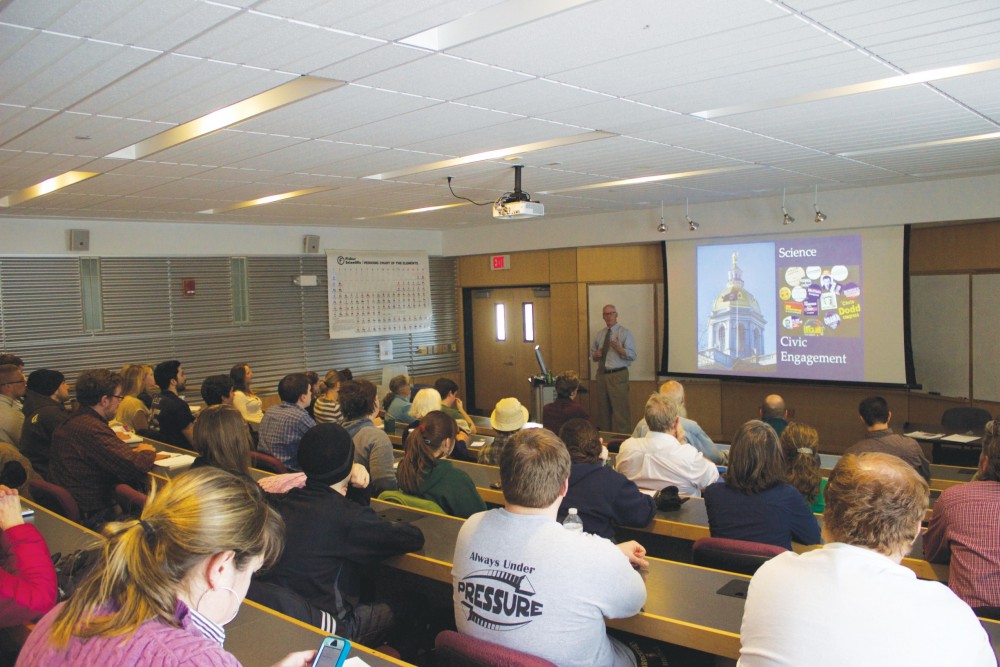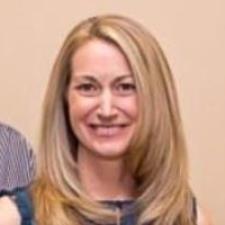 Post Classifieds
Post Classifieds
Environmental Science Colloquium Series
The Changing Climate of Science, Politics, and Climate Change
"I'm here because I do believe that climate is changing," said Roger Stephenson to begin his talk last Wed., Mar. 26.
Stephenson holds an extensive résumé. From 1995 through 1999 he served as Special Assistant to the Secretary of the Interior, and served in the White House Council on Environmental Quality to help manage overall program and policy development for President Clinton's American Heritage River Initiative. Recently he was an outreach consultant for the Union of Concerned Scientists, and since 2002 he has been the Principal and Senior Counsel of Stephenson Strategic Communications.
"Why do I care?" Stephenson said regarding energy conservation, flipping the slide to show a picture of the Black-throated Blue Warbler. "This is the main reason for me. 11 grams, and he makes a trip 2,200 miles twice a year from Venezuela up here and back. And as badly as I feel when a bird that's traveled 2,000 miles hits a windshield of a car going 70 miles per hour on Route 16, I feel much worse about the impact hundreds of millions of people are having on our wildlife and our earth."
Stephenson framed his talk with what he called the five sciences of climate change: peer-reviewed science, popular science, political science, science fiction, and social science, discussing how each one influences public opinion. What seemed like just another lecture on climate change became a call to action.
"All of us, whether we're scientists, students, mothers, fathers, sisters, brothers...we've got this," Stephenson said, pointing to the First Amendment. "In this first amendment it says you cannot be stopped from peaceably assembling and petitioning the government. If this is in the First Amendment, in our Bill of Rights, then it's also our responsibility to petition our government."
In 2007 165 towns out of 183 passed a climate change resolution on their town warrant with what Stephenson called civic-engagement.Peers presenting to peers.Resulting from this was Governor John Lynch's own climate action plan for New Hampshire. The Regional Greenhouse Gas Initiative (RGGI) was then signed into law. In 2009 the proceeds from RGGI went into a fund calling for the best and brightest proposals from the private and non-profit sectors to reduce emissions and save energy. "The first two grants went to shovel ready projects," said Stephenson, "Good decisions practically, bad decisions politically."
By 2010 RGGI was put in the tax plank of the Republican platform as opposition to the new initiative called it an unnecessary tax on New Hampshire citizens. A fight to repeal RGGI was defeated narrowly in 2011, then again in 2013. As a result, the Senate passed the Sea Level Rise Commission into law, with a new state energy plan to follow. This June, the EPA is expected to come out with new strategies and regulations on emissions of CO2 from new and existing power plants, just in time for November elections.
The new regulations from the EPA will require every state to have their own implementation plans like the RGGI. Other states already on board have reportedly created renewable portfolio standards, a regulation that requires the increased production of energy from renewable sources such as wind, solar, biomass, and geothermal.
When asked how long it would take before these strategies would be accepted by the majority, Stephenson pointed to a quote by German philosopher Arthur Schopenhauer, "all truth passes through three stages. First it is ridiculed, second it is violently opposed, third it is taken as self-evident."
Regarding Plymouth State University's own campus, Stephenson said, "PSU is doing amazing work. [They are] retrofitting the oil burners to natural gas." He also applauded President Steen for signing the university's own Climate Action Plan, which lays out energy conservation strategies for upcoming years, including adopting an energy-efficient appliance purchasing policy that requires the purchase of Energy Star certified products in all areas.
A good campaign starts with a bell ringer, says Stephenson, and is executed by a change agent: the students. "Letters to the editor make a difference...that's controlled media." These letters can be as short as 150 words or as long as 350 words. Stephenson encourages concerned citizens to publicly voice their opinions and not just stick to social media.
Questions regarding the campaign and new energy saving strategies can be directed to Roger Stephenson at his personal email: rstephensm@gmail.comor by phone at 603-778-7970.
Get Top Stories Delivered Weekly
More theclockonline News Articles
- The Afrofutures of Feminism: Young, Gifted, and Black
- A Weekend of Darkness
- Elizabeth Warren Visits PSU
- Freedom of Speech at PSU
Recent theclockonline News Articles
Discuss This Article
MOST POPULAR THECLOCKONLINE

Campton Elementary School 8th Grade Silent Auction & Spaghetti Dinner By Rebecca Tgibedes

Will You? By Isabelle Elsasser

Summer in the Sunflowers By Emily Holleran

Student Spotlight: Sabrina Siegel By Justine Walsh
GET TOP STORIES DELIVERED WEEKLY
FOLLOW OUR NEWSPAPER
LATEST THECLOCKONLINE NEWS
RECENT THECLOCKONLINE CLASSIFIEDS
OUTSIDE THE LINES
- A Story To Sing About
- The Gap in Gum Care: Why Caring For Your Teeth’s F...
- Top Tips for Signature Scents and Better-Smelling Laundry
- A Dog Trainer’s Top Tips to Support Pets Through Life S...
- Clear the Air of Indoor Pollutants This Spring
- Stroke & Dementia in Black Men: Tips for Staying Healthy...
- Hispanics and African Americans at Higher Risk for Eye...
- African Americans at Higher Risk for Eye Disease
- Infinity Kings: Final Book In A Favorite Fantasy Series
- What You Need To Know About Keratoconus and the iLink...
FROM AROUND THE WEB
- Pioneering Fast and Affordable Broadband for the Underserved
- 7 Reasons Renting an RV Should Be On Every Family’s S...
- Don’t Let Diabetes Shortchange Your Golden Years
- No Child is Forgotten By Marine Toys for Tots
- Sweeten Your Springtime Salads With Healthy Chilean Grapes
- Young Author Translates 4,000-Year-Old Text to Reveal...
- Keeping Cool and Energy-efficient Amid America’s “...
- Addressing Sarcopenia with a Healthy Diet
- Subway’s New Wraps Elevate Eating on the Go
- Family Teacher Conference Topics Beyond Academics
COLLEGE PRESS RELEASES
- Shoff Promotions Comic Book & Sports Card Show
- Semiconductor Research Corp unveils 2024 Research Call, $13.8M Funding
- Charles River Associates Opens Second Scholarship Cycle, Expands to the UK
- BLUMHOUSE AND AMC THEATRES LAUNCH FIRST-EVER HALFWAY TO HALLOWEEN FILM FESTIVAL
- THE GEN Z IMPERATIVE: LISTEN TO FEELINGS AND GIVE GEN Z A VOICE














